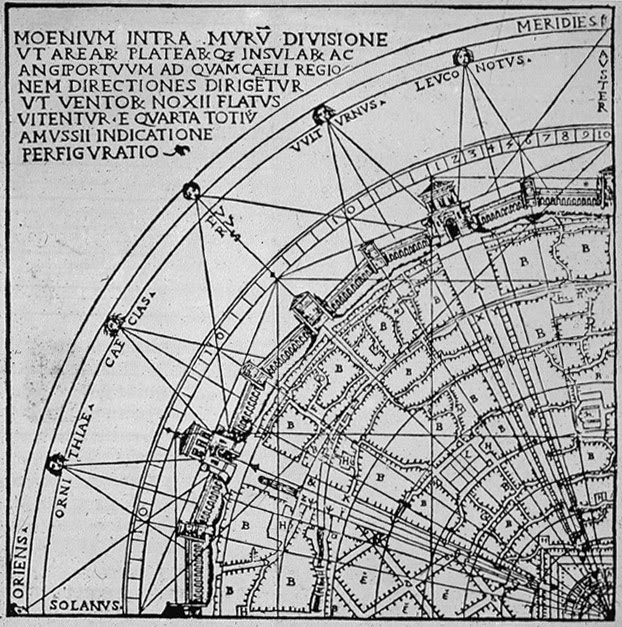 |
| A staggeringly boring 'Ideal' cityscape by Fra Carnevale |
The idea that an ‘ideal city’ is even possible is a
tantalizing dream born of a desire to escape our current situation, wipe the
slate clean and start afresh. It’s part of the reason colonizers get so
glassy-eyed when it comes to setting up shop in a newly colonized space; the
attempt to transcribe the perfect world that exists in our imagination into
real bricks and mortar has excited both creativity and hubris for ages, from
cave-painters to conquistadores. The downside - that you can’t just run away
from human nature - hasn’t failed to excite its own brand of dystopian
creativity too, where writers and artists have pointed out just what a disaster
these utopian delusions invariably turn out to be.
 |
| Vitruvius, Plan of an Ideal City |
From hippy communes to Brasilia,
the attempt to corral people into synchronous alignment is like trying to stop
a spinning drill bit with your lips: You’re welcome to give it a shot, but
it’ll end in tears. At the end of the day, we monkeys don’t like to share our
banana. The synonymy between “idea” and “ideal” means that, by definition, a
thought must stay in our heads if it’s to remain perfect, because as soon as it
turns into action it is reduced and corrupted by the physical world.
 |
| Renaissance ideal cities inspired by Vitruvius (15th-16th c.) 1. Filarete, 2. Fra Giocondo, 3. Girolamo Maggi, 4. Giorgio Vasari, 5. Antonio Lupicini, 6. Daniele Barbaro, 7. Pietro Cattaneo, 8/9 di Giorgio Martini. [source] |
Werner
Herzog’s documentary, “Encounters at the End of the World,” has its share of
misfits and oddballs all drawn like lemmings to the polar research station at
McMurdo Sound in Antarctica, in some ill-conceived attempt to “get away,” only
to end up living in closer proximity with other oddballs than they ever would
have if they’d just stayed back home. What sustains and enables them to stay
cooped up inside for months on end is simply the idea of all that space around them, far away from the big bad
world, demonstrating the power of a good concept to overwrite empirical
reality.
 |
| From Hugh Ferris’s “The Metropolis of Tomorrow” (1929) |
Plato would argue that Ideal Forms are not just in our heads, that
they have a very real existence outside of space and time, and that they are
the models from which our world is built. They prevent us from sinking into depravity
and weekend marathons of Duck Dynasty
by reminding us that we are better than that; that as we careen through life we
should be more honest, more courageous, more compassionate.



























Nice post Al!
ReplyDeleteI like your argument and think it applies to just about any ideal, doesn't have to be a city.
Your post as always is amusing and thoughtful. It got me thinking about things like the relativity of our supposed individuality, the sources of our natural creativity, etc, and then I stumbled upon this little gem: "The Hidden Geometry of Flowers" by the remarkable Keith Critchlow. Check it out. It's treasury. Good soul food.
". . . as we careen through life we should be more honest, more courageous, more compassionate."
ReplyDeleteI'll go with that
Thanks
It's amazing painting.
ReplyDeleteThanks for sharing, nice post! Post really provice useful information!
ReplyDeleteGiaonhan247 chuyên dịch vụ mua hộ hàng mỹ về VN và dịch vụ ship hàng nhật uy tín, giá rẻ cũng như chia sẻ kinh nghiệm cách order taobao về VN giá rẻ.